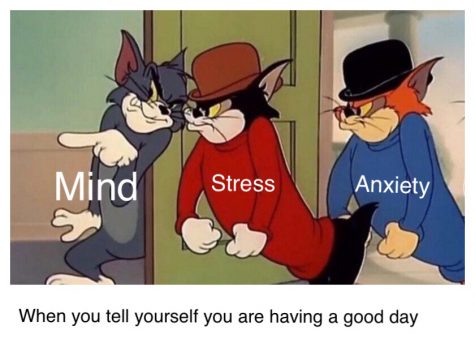Death, Depression, and Memes
September 28, 2018

BY MINYI SITU
Dark humor is not new, and neither is using laughter to mask fears or seem socially acceptable. The humor of our era reflects upon social issues, but often, humor can minimize problems to the extent of desensitizing people. The humor we are referring to are—of course—memes. The sheer amount of memes related to suicide and depression drowns out the cries of the afflicted party with a sea of hesitant laughter. It’s no secret there is something inherently wrong about making jokes based on mental health problems, especially in an age of extreme social awareness on the subject of psychological issues. Ironically, the more ‘socially aware’ we become of mental health, the more subject we are to making it seem less of a problem.
Anyone who hasn’t been living under a rock has heard of the apparent wide epidemic of depression, owing to social media and countless articles regurgitating the same spiel about mental health awareness. These serious topics are often under siege by people who joke to relieve themselves, people who are afraid to seriously talk about their own mental health, and people who are inclined to conform. It doesn’t matter how the memes started, the real issue is that they are becoming problematic for those who suffer serious strains of depression. Perhaps it is the prevalence of depression that justifies the way depression is joked about regularly. The CDC reports that 1 out of 6 adults will experience depression at some point in their life. This isn’t considering the fact teenagers are also a target for the mental disorder. Despite all that, the widespread nature of depressive disorders is not reason enough to normalize it with jokes about suicide. Perpetuating the notion of life equating to suffering is far from healthy for both depressed and non-depressed people. To incorporate a mental illness into the fabric of society as normal pessimistically acknowledges that life is centered around unhappiness. In fact, a wave of so-called ‘nihilism’ has become apparent in the younger generation—which, funnily enough, is also acknowledged in memes and supported with meme evidence.
At this point, saying “depression and suicide should not be joked about” has become a repetitive phrase scratched out by a broken record. It’s not something that can be fixed, but the world needs to legitimize depression. For every time someone responds “same” to “I’m so depressed” or “I want to kill myself,” mental health is becoming devalued, whether or not the individuals in question are actually depressed or suicidal. It’s come to a point where when someone says “I actually have depression,” they could either actually be diagnosed with depression or being melodramatic. The very idea of what depression has become distorted by humor. Maybe memes help raise awareness around stigmatized issues, but it doesn’t help the stigma. Putting a veil over mental health with a meme of Pepe about to stick a fork in an outlet undoubtedly raises a few laughs, but in the grand scheme of things, the situation isn’t getting any better. People do cope with problems in their own way, and that includes making memes to minimize their own problems. Because of the powerful stigma around mental health and the awkwardness it can bring to any social situation, most people keep to themselves when it comes to having a serious conversation about being depressed or suicidal. There may not be anything to be done about memes, but people have to recognize that depression needs to be taken care of.
Too often, odd glances are tossed at people who have been known to be suicidal or people who are diagnosed with depression as if they fit into the mold of a lame, sad, morose person from depression awareness posters. It might not be fun or seem natural to hang around a gloomy person all the time because we rarely have to experience friends crying or openly talking about their problems earnestly, but people’s emotions have to be taken at face value and given out with honesty. There shouldn’t be a social barrier that blocks people from discussing serious matters to close friends and family members. Jokes about depression prevent basic communication from happening when listening is a big part of helping someone with depression. It would be too much to call for an abrupt end to all memes about depression and suicide, especially since it is a coping mechanism for many, but it wouldn’t hurt for people to acknowledge depression as a serious condition. Society needs to stop treating depression as a distant thing where people with depression are different, melancholy shells and start raising awareness about what depression really is and the truth behind how depression really looks.
Mental health awareness isn’t as simple as knowing a mental disorder exists—it’s also remembering the complex individuals that contract those mental disorders. That includes the human nature of creating humor that unintentionally minimizes issues and the existence of awkwardness around serious topics as a result of the inner workings of social situations. We also have to remember that jokes do not present pure, unadulterated truth and that we have to look beyond the mask truth often likes to hide behind.

